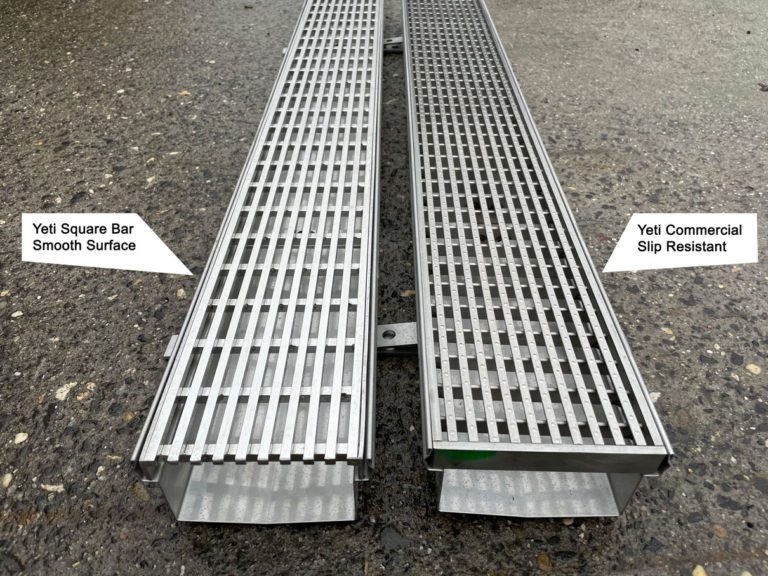When managing water runoff and drainage, trench drains are a popular and effective solution to prevent flooding and protect your property. Trench drains are linear systems that collect and direct water away from a specific area, making them perfect for applications such as driveways, patios, parking lots, swimming pools, and even industrial settings.
Choosing a suitable material is one of the most critical decisions when installing a trench drain. Your preferred material can impact the drain’s performance, durability, and maintenance requirements.
Stainless stea
This guide will discuss the various trench drain materials available, their advantages and disadvantages, and help you determine which material is best for your specific application:
1. Polymer Concrete
One of the most popular trench drain materials is polymer concrete. It is a composite material made from aggregate, sand, and resin. This combination results in a strong, durable, and corrosion-resistant product that can withstand heavy loads and harsh environments.
Pros:
- High strength and durability
- Resistant to chemicals and corrosion
- Low maintenance
- Easy to install
- Suitable for heavy-duty applications
Cons:
- More expensive than other materials
- Can be prone to cracking under extreme temperature fluctuations
Best for: Industrial and commercial applications, heavy traffic areas, and high-load requirements.
2. Fiberglass
Fibreglass trench drains are made from glass fibres and resin, creating a lightweight, strong, and corrosion-resistant material. They are ideal for applications where chemical resistance and durability are essential.
Pros:
- Lightweight and easy to install
- Resistant to chemicals and corrosion
- Low maintenance
- High strength-to-weight ratio
Cons:
- More expensive than some other materials
- Not as strong as polymer concrete
Best for: Applications requiring chemical resistance, such as food processing plants, laboratories, and chemical storage areas.
3. High-Density Polyethylene (HDPE)
HDPE trench drains are made from durable, lightweight plastic material resistant to chemicals, corrosion, and UV exposure. This type of trench drain is popular for its ease of installation and lower cost than other materials.
Pros:
- Lightweight and easy to install
- Resistant to chemicals, corrosion, and UV exposure
- Low maintenance
- Economical option
Cons:
- Not as strong as polymer concrete or fibreglass
- Not recommended for heavy-load applications
Best for: Residential and light commercial applications, such as driveways, patios, and swimming pools.
4. Cast Iron
Cast iron trench drains are known for their strength and durability, making them an excellent choice for heavy-duty applications. They are often used in commercial and industrial settings where high loads and heavy traffic are expected.
Pros:
- High strength and durability
- Suitable for heavy-load applications
- Long-lasting
Cons:
- Heavy and more challenging to install
- Susceptible to corrosion and rust
- Higher maintenance requirements
- More expensive than other materials
Best for: Heavy-duty commercial and industrial applications, such as parking lots and manufacturing facilities.
5. Stainless Steel
Last, but certainly not least, stainless steel trench drains offer a sleek, modern appearance and excellent strength, durability, and corrosion resistance. They are commonly used in commercial kitchens, food processing plants, and other sanitary environments where cleanliness and hygiene are crucial, but are also perfect for outdoor environments such as pools, gardens, driveways and more light or heavy traffic.
Pros:
- Strong and durable
- Suitable for heavy-load applications
- Resistant to chemicals and corrosion
- Low maintenance
- Lightweight and easy to install
- Resistant to chemicals, corrosion, and UV exposure
- Aesthetically pleasing
Cons:
- Slightly expensive than other materials (but, not always)
Best for: Anywhere, indoors, outdoors, pools, stormwater control, garages, driveways, landscaping, yards, residential and commercial properties, commercial kitchens, food processing plants, and other sanitary environments.
Conclusion
Selecting the suitable trench drain material for your application is essential for optimal performance, durability, and long-term success. By carefully considering the advantages and disadvantages of each material, you can make an informed decision based on your specific needs and budget. That said, whether you require a heavy-duty solution for an industrial setting or a lightweight option for your residential property, a trench drain material is available to meet your requirements. Feel free to contact professionals to understand your needs and get them satisfied with the right solution!
Yeti Civil Products has the expertise to offer you top-notch solutions and systems, using durable stainless steel drains and grates. We focus on providing high-end stainless steel trough and grate options. If you want metal drainage grates and more, check out what we offer!

